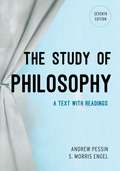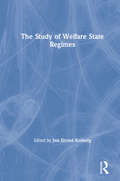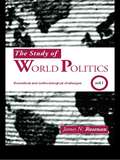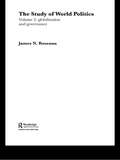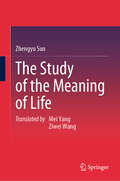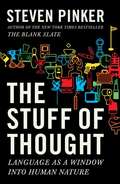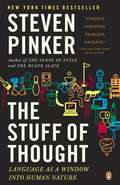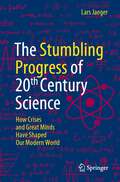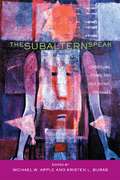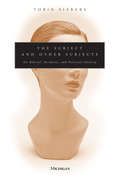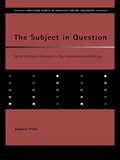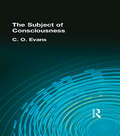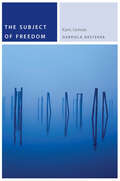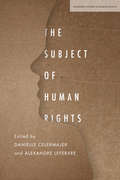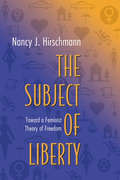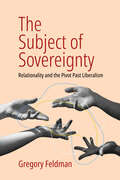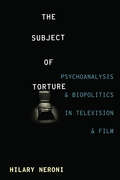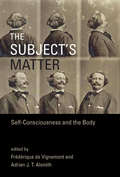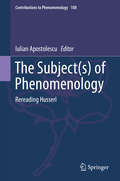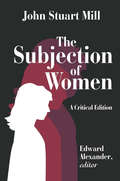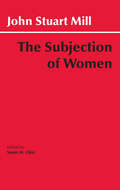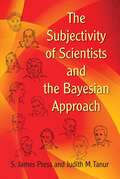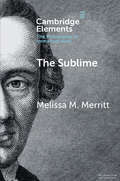- Table View
- List View
The Study of Philosophy: A Text with Readings (7th Edition)
by Andrew Pessin S. Morris EngelFrom Plato to Plantinga, from Aristotle to Ayer, and from Socrates to Singer, this text brings the power of both ancient and modern philosophy to students of the twenty-first century! This seventh edition of The Study of Philosophy presents a comprehensive treatment of the major fields and figures of philosophy alongside primary readings to fuel debate and further study. New chapters in this edition feature: ·A substantive account of philosophical theology ·A reorganized treatment of early modern rationalism and empiricism ·A discussion of the major highlights of twentieth- and twenty-first-century philosophy ·A survey of major contemporary moral problems
The Study of Welfare State Regimes
by Jon Eivind KolbergExamines the interaction between labour markets and the welfare state at the institutional level. Topics discussed include the legislative structuring of programmes, how the characteristics of programmes have changed over time, and the private and public mix of programmes.
The Study of World Politics: Volume 1: Theoretical and Methodological Challenges
by James N. RosenauThe Study of World Politics is two volume set that presents thirty-nine essays of some two hundred essays authored by Professor James Rosenau, a renowned international political theorist. They include both articles recently published and those that have not previously been published. All of them focus on the theme of the study of world politics, with the twenty-three articles in this volume devoted to probing theoretical and methodological challenges. This volume is divided into five parts and address such issues as: the challenge of world politics the professional political scientist methods concepts and theories the analysis of foreign policy. Included in this collection is perhaps James Rosenau’s most widely-read essay, ‘Pre-Theories and Theories of Foreign Policy’ as well as several essays that articulate various dimensions of global governance and how they are shaped by the dynamics of globalization. These articles are marked by unique and imaginative formulations which break with a number of conventional approaches employed in the fields of international relations and foreign policy. The Study of World Politics provides the reader with access for the first time to a collection of James Rosenau’s outstanding scholarship, making this an invaluable book to students and academics with interests in politics.
The Study of World Politics: Volume 2: Globalization and Governance
by James N. RosenauJames Rosenau’s work is known for its originality and clarity and the sixteen articles in this new volume are no exception. Tackling the specific challenges posed by globalization and governance, this book covers four key areas: the challenge – tensions, contradictions, outcomes and global affairs the profession – community, globalized space and international relations globalization – complexities, contradictions and theory governance – understanding and future The Study of World Politics presents the thinking of one of the most innovative scholars in the last half century. The subjects addressed provide the big picture, whilst also being meticulous in detail. This new book gives the reader an unparalleled understanding of globalization and governance and is an invaluable tool to students and scholars of politics and world affairs alike.
The Study of the Meaning of Life
by Zhengyu SunBased on the revelation and analysis of the social self-consciousness contained in the individual self-consciousness of the meaning of life, the book discusses the human life-world, spiritual world, cultural world and meaning-world. Then, it states the life-world, modes of thought, values ideas, aesthetic consciousness and ultimate concerns of modern humans. It also systematically expounds on the cultivation, the truth, the nurture, the sublimation, the support, the tension and the source of the spiritual home in perspectives of education, science, art, philosophy, theory, mentality and ideals. Constructing a fulfilling spiritual home for man is the realistic meaning of this book.
The Stuff of Thought: Language as a Window into Human Nature
by Steven PinkerThe author explains how the mind works by examining the way we use words. Pinker takes on scientific questions - such as how language affects thought, and which of our concepts are innate - as well as questions from the headlines and everyday life.
The Stuff of Thought: Language as a Window into Human Nature
by Steven PinkerThis New York Times bestseller is an exciting and fearless investigation of language Bestselling author Steven Pinker possesses that rare combination of scientific aptitude and verbal eloquence that enables him to provide lucid explanations of deep and powerful ideas. His previous books?including the Pulitzer Prize finalist The Blank Slate?have catapulted him into the limelight as one of today?s most important popular science writers. In The Stuff of Thought, Pinker presents a fascinating look at how our words explain our nature. Considering scientific questions with examples from everyday life, The Stuff of Thought is a brilliantly crafted and highly readable work that will appeal to fans of everything from The Selfish Gene and Blink to Eats, Shoots & Leaves.
The Stumbling Progress of 20th Century Science: How Crises and Great Minds Have Shaped Our Modern World
by Lars JaegerThe 70 years from 1880 to 1950 witnessed the final ascent of humankind into the modern age. Historically, this period is characterized by deep political, social and economic crises. However, parallel to this and much less known in the public, rational scientific thinking also experienced the darkest and deepest crisis of its own history. All the great modern scientific discoveries like quantum theory, genetics and neurology are products of this. Ground-breaking discoveries, profound crises, revolutionary thoughts, refutation of previously unshakable beliefs - these years are marked by scientific achievements of numerous great minds, who overturned our understanding of the world, of space, time and infinity, of life, logic and calculability almost overnight. The "intuitive genius" of these pioneers still forms the foundation of today’s scientific thinking and technological progress. In fact, tackling and overcoming those deep scientific crises shaped our modern life like nothing else. The resulting reorientation of our understanding of nature and ourselves allowed ancient philosophical questions to appear in a new light: "What is reality?", "What can we know about the world?" or "What is man's place in nature?". The most exciting period in the history of science is retold here in an entertaining way.
The Subaltern Speak: Curriculum, Power, and Educational Struggles
by Michael W. Apple Kristen L. BurasThe question of whose perspective, experience and history is privileged in educational institutions has shaped curriculum debates for decades. In this insightful collection, Michael W. Apple and Kristen L. Buras interrogate the notion that some knowledge is worth more than others. The Subaltern Speak combines an analysis of the ways in which various forms of power now operate, with a specific focus on spaces in which subaltern groups act to reassert their own perceived identities, cultures and histories.
The Subject and Other Subjects: On Ethical, Aesthetic, and Political Identity
by Tobin SiebersThe Subject and Other Subjectstheorizes the differences among ethical, aesthetic, and political conceptions of identity. When a person is called beautiful, why does it strike us as an objectification? Is a person whom we consider to be an exemplary person still a person, and not an example? Can one person conceive what it means to have the perspective of a community? This study treats these thorny issues in the context of recent debates in cultural studies, feminism, literary criticism, narrative theory, and moral philosophy concerning the nature and directions of multiculturalism, post-modernity, and sexual politics. Tobin Siebers raises a series of questions that "cross the wires" among ethical, aesthetic, and political definitions of the self, at once exposing our basic assumptions about these definitions and beginning the work of reconceiving them. The Subject and Other Subjectswill broaden our ideas about the strange interplay between subjects and objects (and other subjects!) that characterizes modern identity, and so provoke lively debate among anthropologists, art historians, literary theorists, philosophers, and others concerned with how the question of the subject becomes entangled with ethics, aesthetics, and politics. As Siebers argues, the subject is in fact a tangled network of subjectivities, a matrix of identities inconceivable outside of symbols and stories. Tobin Siebers is Professor of English at the University of Michigan, and author ofCold War Criticism and the Politics of Skepticism; Morals and Stories; The Ethics of Criticism; The Romantic Fantastic; andThe Mirror of Medusa.
The Subject in Question: Sartre's Critique of Husserl in The Transcendence of the Ego (Routledge Studies in Twentieth-Century Philosophy)
by Stephen PriestThe Subject in Question provides a fascinating insight into a debate between two of the twentieth century's most famous philosophers - Jean-Paul Sartre and Edmund Husserl - over the key notions of conscious experience and the self. Sartre's The Transcendence of the Ego, published in 1937, is a major text in the phenomenological tradition and sets the course for much of his later work. The Subject in Question is the first full-length study of this famous work and its influence on twentieth-century philosophy. It also investigates the relationship between Sartre's ideas and the earlier work of Descartes and Kant.
The Subject of Consciousness
by C. O. EvansFirst published in 2002. Routledge is an imprint of Taylor & Francis, an informa company.
The Subject of Freedom: Kant, Levinas (Commonalities)
by Gabriela BasterraIs freedom our most essential belonging, the intimate source of self-mastery, an inalienable right? Or is it something foreign, an other that constitutes subjectivity, a challenge to our notion of autonomy? To Basterra, the subjectivity we call free embodies a relationship with an irreducible otherness that at once exceeds it and animates its core.Tracing Kant’s concept of freedom from the Critique of Pure Reason to his practical works, Basterra elaborates his most revolutionary insights by setting them in dialogue with Levinas’s Otherwise than Being. Levinas’s text, she argues, offers a deep critique of Kant that follows the impulse of his thinking to its most promising consequences. The complex concepts of freedom, autonomy, and subjectivity that emerge from this dialogue have the potential to energize today’s ethical and political thinking.
The Subject of Human Being (Routledge Studies in Critical Realism)
by Christopher W. HaleyThe Subject of Human Being presents a sweeping account of the nature of human existence. As a work of philosophical anthropology, the analysis ranges from the basic powers emerging from the mind, to our extraordinary psychological capacities, to the shared sociocultural worlds we inhabit. The book integrates different perspectives on social ontology from a selection of philosophers and theorists, whose advances toward understanding the relationship between individuals and society ought to revolutionize social theory as understood and practiced in the social sciences and humanities. Although grounded in critical realist philosophy of Roy Bhaskar and the social theory of Margaret Archer, the book also draws from philosophy of mind, phenomenology of consciousness, psychoanalytic theory, virtue ethics, and personalism to support and extend its arguments. Four elements of human existence are examined: the nature of consciousness, agency, subjectivity, and the social world. Thus, it addresses related issues of power, the agent-structure problem, the formation of beliefs and desires, human universals, and human rights. Portraying a unified social theory that is materialist, realist, dialectical, and centered on emergence, and offering a comprehensive and progressive theory of human being, this book is essential reading for students and scholars of critical realism, philosophy, and the social sciences.
The Subject of Human Rights (Stanford Studies in Human Rights)
by Danielle Celermajer and Alexandre LefebvreThe Subject of Human Rights is the first book to systematically address the "human" part of "human rights." Drawing on the finest thinking in political theory, cultural studies, history, law, anthropology, and literary studies, this volume examines how human rights—as discourse, law, and practice—shape how we understand humanity and human beings. It asks how the humanness that the human rights idea seeks to protect and promote is experienced. The essays in this volume consider how human rights norms and practices affect the way we relate to ourselves, to other people, and to the nonhuman world. They investigate what kinds of institutions and actors are subjected to human rights and are charged with respecting their demands and realizing their aspirations. And they explore how human rights shape and even create the very subjects they seek to protect. Through critical reflection on these issues, The Subject of Human Rights suggests ways in which we might reimagine the relationship between human rights and subjectivity with a view to benefiting human rights and subjects alike.
The Subject of Liberty: Toward a Feminist Theory of Freedom
by Nancy J. HirschmannThis book reconsiders the dominant Western understandings of freedom through the lens of women's real-life experiences of domestic violence, welfare, and Islamic veiling. Nancy Hirschmann argues that the typical approach to freedom found in political philosophy severely reduces the concept's complexity, which is more fully revealed by taking such practical issues into account. Hirschmann begins by arguing that the dominant Western understanding of freedom does not provide a conceptual vocabulary for accurately characterizing women's experiences. Often, free choice is assumed when women are in fact coerced--as when a battered woman who stays with her abuser out of fear or economic necessity is said to make this choice because it must not be so bad--and coercion is assumed when free choices are made--such as when Westerners assume that all veiled women are oppressed, even though many Islamic women view veiling as an important symbol of cultural identity. Understanding the contexts in which choices arise and are made is central to understanding that freedom is socially constructed through systems of power such as patriarchy, capitalism, and race privilege. Social norms, practices, and language set the conditions within which choices are made, determine what options are available, and shape our individual subjectivity, desires, and self-understandings. Attending to the ways in which contexts construct us as "subjects" of liberty, Hirschmann argues, provides a firmer empirical and theoretical footing for understanding what freedom means and entails politically, intellectually, and socially.
The Subject of Sovereignty: Relationality and the Pivot Past Liberalism
by Gregory FeldmanSeeking new forms of democracy, progressive politics raises a fundamental question: what is the alternative to the allegedly coherent, self-contained liberal subject that represents the project of modernity? Exploring the themes of nature, race, and the divine, this book identifies the more realistic alternative in the “relational subject”: a subject that is inseparable from the global field of relations through which it emerges and yet distinct from that field because it lives a life that no one else ever has. Recognizing ourselves as such subjects allows us not only to rethink politics, but, more profoundly, to envision sovereignty as the means by which we each rejuvenate ourselves and the polities we constitute with others.
The Subject of Torture: Psychoanalysis and Biopolitics in Television and Film
by Hilary NeroniConsidering representations of torture in such television series as 24, Alias, and Homeland; the documentaries Taxi to the Dark Side (2007), Ghosts of Abu Ghraib (2007), and Standard Operating Procedure (2008); and "torture porn" feature films from the Saw and Hostel series, Hilary Neroni unites aesthetic and theoretical analysis to provide a unique portal into theorizing biopower and its relation to the desiring subject. Her work ultimately showcases film and television studies' singular ability to expose and potentially disable the fantasies that sustain torture and the regimes that deploy it.
The Subject's Matter: Self-Consciousness and the Body (Representation and Mind series)
by Frédérique De Vignemont Adrian J. T. AlsmithAn interdisciplinary and comprehensive treatment of bodily self-consciousness, considering representation of the body, the sense of bodily ownership, and representation of the self.The body may be the object we know the best. It is the only object from which we constantly receive a flow of information through sight and touch; and it is the only object we can experience from the inside, through our proprioceptive, vestibular, and visceral senses. Yet there have been very few books that have attempted to consolidate our understanding of the body as it figures in our experience and self-awareness. This volume offers an interdisciplinary and comprehensive treatment of bodily self-awareness, the first book to do so since the landmark 1995 collection The Body and the Self, edited by José Bermúdez, Naomi Eilan, and Anthony Marcel (MIT Press). Since 1995, the study of the body in such psychological disciplines as cognitive psychology, cognitive neuroscience, psychiatry, and neuropsychology has advanced dramatically, accompanied by a resurgence of philosophical interest in the significance of the body in our mental life. The sixteen specially commissioned essays in this book reflect the advances in these fields. The book is divided into three parts, each part covering a topic central to an explanation of bodily self-awareness: representation of the body; the sense of bodily ownership; and representation of the self.ContributorsAdrian Alsmith, Brianna Beck, José Luis Bermúdez, Anna Berti, Alexandre Billon, Andrew J. Bremner, Lucilla Cardinali, Tony Cheng, Frédérique de Vignemont, Francesca Fardo, Alessandro Farnè, Carlotta Fossataro, Shaun Gallagher, Francesca Garbarini, Patrick Haggard, Jakob Hohwy, Matthew R. Longo, Tamar Makin, Marie Martel, Melvin Mezue, John Michael, Christopher Peacocke, Lorenzo Pia, Louise Richardson, Alice C. Roy, Manos Tsakiris, Hong Yu Wong
The Subject: Rereading Husserl (Contributions to Phenomenology #108)
by Iulian ApostolescuBringing together established researchers and emerging scholars alike to discuss new readings of Husserl and to reignite the much needed discussion of what phenomenology actually is and can possibly be about, this volume sets out to critically re-evaluate (and challenge) the predominant interpretations of Husserl’s philosophy, and to adapt phenomenology to the specific philosophical challenges and context of the 21st century. “What is phenomenology?”, Maurice Merleau-Ponty asks at the beginning of his Phenomenology of Perception – and he continues: “It may seem strange that this question still has to be asked half a century after the first works of Husserl. It is, however, far from being resolved.” Even today, more than half a century after Merleau-Ponty’s magnum opus, the answer is in many ways still up for grasp. While it may seem obvious that the main subject of phenomenological inquiry is, in fact, the subject, it is anything but self evident what this precisely implies: Considering the immense variety of different themes and methodological self-revisions found in Husserl’s philosophy – from its Brentanian beginnings to its transcendental re-interpretation and, last but not least, to its ‘crypto-deconstruction’ in the revisions of his early manuscripts and in his later work –, one cannot but acknowledge the fact that ‘the’ subject of phenomenology marks an irreducible plurality of possible subjects. Paying tribute to this irreducible plurality the volume sets out to develop interpretative takes on the phenomenological tradition which transcend both its naive celebration and its brute rejection, to re-articulate the positions of other philosophers within the framework of Husserl’s thought, and to engage in an investigative dialogue between traditionally opposed camps within phenomenology and beyond.
The Subjection of Women: Original Edition Of 1911 (Barnes And Noble Library Of Essential Reading Ser.)
by John Stuart MillThe Subjection of Women, which Mill wrote in 1861 but did not publish until 1869, is one of the seminal texts of feminism and aroused more antagonism than anything Mill ever wrote. Conservatives predicted it would do to the English family what socialism would do to England's economy. Liberals believed that women would vote conservative. Many prominent Englishwomen, such as Charlotte Brontë, Elizabeth Barrett Browning, Christina Rossetti, and George Eliot, opposed women's suffrage. Even such advanced thinkers as Sigmund Freud were hostile to the book.In The Subjection of Women Mill argues with lucidity, force and more than usual metaphorical eloquence that "the principle which regulates the existing social relations between the two sexes-the legal subordination of one sex to the other-is wrong in itself, and now one of the chief hindrances to human improvement; and that it ought to be replaced by a principle of perfect equality..." Mill does battle on two fronts, that of intrinsic justice and that of utility. He sees the subjection of women as not only inherently wrong, but intertwined with all the evils of existing society. In support of his central principle, Mill argues that there is no basis in nature for the inferior status of women. He likens the position of the Victorian wife to that of a domestic slave and discourses on the debasing nature of all master-slave relations. He provides historical evidence of what women are capable of achieving and he speculates upon the benefits that will accrue to society as well as individuals from female emancipation, most especially from equality in marriage, which Mill describes as the only remaining legal form of slavery.This new critical edition shows that Mill's classic work has lost none of its relevance. The cross-disciplinary approach of the book can be useful in literature, history, or sociology courses as well as womens studies.
The Subjection of Women: Original Edition Of 1911 (Hackett Classics)
by John Stuart Mill"Reasonably priced and beautifully produced. A clear and helpful introduction by Susan Okin, one of the leading feminist scholars of our generation, as well as a useful bibliography and chronology of Mill's life. . . . Invaluable for teaching and scholarship alike." --Ian Shapiro, Yale University
The Subjectivity of Scientists and the Bayesian Approach (Dover Books on Mathematics #775)
by S. James Press Judith M. Tanur"Press and Tanur argue that subjectivity has not only played a significant role in the advancement of science but that science will advance more rapidly if the modern methods of Bayesian statistical analysis replace some of the more classical twentieth-century methods." -- SciTech Book News."An insightful work." - Choice."Compilation of interesting popular problems ... this book is fascinating." -- Short Book Reviews, International Statistical Institute.Subjectivity - including intuition, hunches, and personal beliefs - has played a key role in scientific discovery. This intriguing book illustrates subjective influences on scientific progress with historical accounts and biographical sketches of more than a dozen luminaries, including Aristotle, Galileo, Newton, Darwin, Pasteur, Freud, Einstein, Margaret Mead, and others. The treatment also offers a detailed examination of the modern Bayesian approach to data analysis, with references to the Bayesian theoretical and applied literature. Suitable for lay readers as well as science specialists, this survey will also appeal to historians of science and those interested in knowing more about the Bayesian approach.
The Sublime
by Timothy M. Costelloe"This volume offers readers a unique and comprehensive overview of theoretical perspectives on "the sublime," the singular aesthetic response elicited by phenomena that move viewers by transcending and overwhelming them. The book consists of an editor's introduction and fifteen chapters written from a variety of disciplinary perspectives. Part One examines philosophical approaches advanced historically to account for the phenomenon, beginning with Longinus, moving through eighteenth and nineteenth century writers in Britain, France, and Germany, and concluding with developments in contemporary continental philosophy. Part Two explores the sublime with respect to particular disciplines and areas of study, including Dutch literature, early modern America, the environment, religion, British Romanticism, the fine arts, and architecture. Each chapter is both accessible for nonspecialists and offers an original contribution to its respective field of inquiry"--
The Sublime (Elements in the Philosophy of Immanuel Kant)
by Melissa McBay MerrittThis Element considers Kant's account of the sublime in the context of his predecessors both in the Anglophone and German rationalist traditions. Since Kant says with evident endorsement that 'we call sublime that which is absolutely great' (Critique of the Power of Judgment, 5:248) and nothing in nature can in fact be absolutely great (it can only figure as such, in certain presentations), Kant concludes that strictly speaking what is sublime can only be the human calling (Bestimmung) to perfect our rational capacity according to the standard of virtue that is thought through the moral law. The Element takes account of the difference between respect and admiration as the two main varieties of sublime feeling, and concludes by considering the role of Stoicism in Kant's account of the sublime, particularly through the channel of Seneca.
